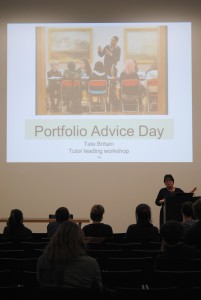18.03.2015, ZHdK:
Hopes and Fears for Art: Policy and Practice in Widening Participation in Art and Design Higher Education in the UK
Jackie McManus (University of the Arts, London)

Jackie McManus’ evening lecture drew on one of the core references for Art.School.Differences: The study “Art for a Few: Exclusion and Misrecognition in Higher Art and Design Education” by Penny Jane Burke and Jackie McManus (2009). This study evaluated the British government initiative “Widening Participation” (WP) a ongoing programme that has redressed the under-representation of certain social groups in higher education since the late 1990s. While WP has become a key policy discourse (in the UK and internationally), McManus reminded us that the objective of diversifying the student body is still largely driven by economic and utilitarian aims of creating a better-educated workforce. WP’s neo-liberal motivations are paralleled and underpinned by the increasing marketization of higher education: degrees in art and design subjects are no longer eligible for government subsidy, and the reality is that that is restricting, rather than widening participation.
McManus’s presentation illuminated the insidious ways in which exclusion still operates by focusing on the admissions procedures she observed at five British art schools. In particular she examined the case of a black working-class woman, on whose admissions interview she sat in. The interview with the young woman, who was applying for a fashion design BA, was cut short after said she was influenced by hip hop and interested in designing sports tops. Before the interview took place, the interviewers had not deemed her portfolio weak. But after the interview they agreed they would say her portfolio was weak as the reason for rejecting her. In her assessment form the tutors made notes about the “unfashionable clothes” she was wearing. Moreover, the fact that the candidate intended to live with her parents while studying was read as a sign of immaturity. The “expensively dressed” English-white middle-class male candidate interviewed immediately afterwards, who intended to leave home (“because it’s all part of the experience”), and “cited famous contemporary artists”, but had “considerably poorer qualifications,” was offered a place.
Admission practices are tied up with complex operations of exclusion that privilege the habitus and “the cultural and linguistic capital of ’traditional’ students, who tend to come from white, middle-class backgrounds.” McManus’ findings confirm the observations the Art.School.Differences team made within the admissions procedures at Swiss art schools: In McManus’ words, admissions judgments tend to be “shaped by implicit, institutionalized, disciplinary and racialised perspectives of what counts as legitimate forms of experience and knowledge.” It is thus not enough to work at rendering admissions processes more “transparent;” transparency alone does not make them more “fair.” Fairness implies teaching those with the supposedly “wrong” influences and backgrounds, how to access and decipher admissions information, how to decode unspoken institutional assumptions and how to develop their own (admissions) strategies and portfolios. Often, however, art educators who work with working-class and “Black and ethnic minority” youth focus on vocational techniques (such as making handbags or printing T-shirts) rather than on imparting the discursive skills and strategies it takes to access and persist in the field of higher art education themselves.
Admission practices are tied up with complex operations of exclusion that privilege the habitus and “the cultural and linguistic capital of ’traditional’ students, who tend to come from white, middle-class backgrounds.” McManus’ findings confirm what the Art.School.Differences team observed within the admissions procedures at Swiss art schools: In McManus’ words, admissions judgments tend to be “shaped by implicit, institutionalized, disciplinary and racialised perspectives of what counts as legitimate forms of experience and knowledge.” It is thus not enough to work at rendering admissions processes more “transparent;” transparency alone does not make them more “fair.” Fairness implies teaching those with the supposedly “wrong” influences and backgrounds, how to access and decipher admissions information, how to decode unspoken institutional assumptions and how to develop their own (admissions) strategies and portfolios. Often, however, art educators who work with working-class and “ethnic minority” youth focus on vocational techniques (such as making handbags or printing T-shirts) rather than on imparting the discursive skills and strategies it takes to access and persist in the field of higher art education themselves.
Jackie McManus’s PowerPoint Presentation: McManus_Lecture_Widening Participation
Serena O. Dankwa
is a classical musician who became a radio journalist who became a black feminist anthropologist
https://www.zhdk.ch/?person/detail&id=201721
